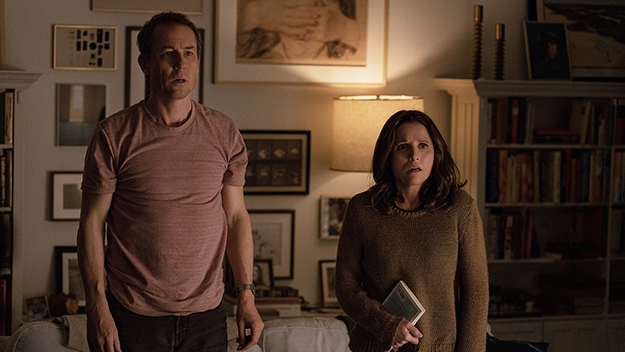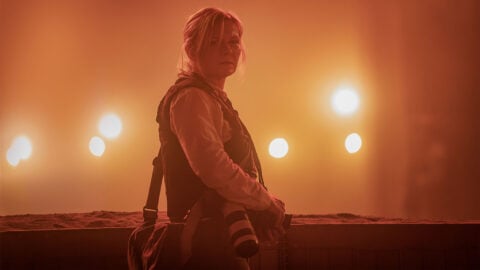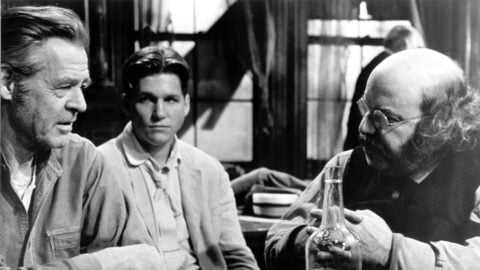Little White Lies
This article appeared in the June 8, 2023 edition of The Film Comment Letter, our free weekly newsletter featuring original film criticism and writing. Sign up for the Letter here.

You Hurt My Feelings (Nicole Holofcener, 2023)
There’s a moment in You Hurt My Feelings when Beth (Julia Louis-Dreyfus) is talking with her agent, to whom she’s recently sent her new novel. Over coffee, they discuss her previous book, a memoir, which did pretty well. Nevertheless, with the market what it is today, hers is an “old voice.” Not only that, but the abuse she described in her memoir was “only verbal”—nothing rough or life-threatening. In other words, it doesn’t quite clear the youth-diversity-and-trauma bar of today. The agent, as agents do, is trying to prepare her for disappointment by gently suggesting she is maybe not as saleable as she once was. For any writer over 40 who’s watching, each word may feel like a drop of acid. There’s worse to come. Beth and her sister (Michaela Watkins) overhear Beth’s husband Don (Tobias Menzies) and brother-in-law (Arian Moayed) talking about her manuscript. Her adored Don dislikes it immensely but is afraid to tell her. Her entire sense of self begins to disintegrate.
Not the end of the world, you might say, and certainly as First World a Problem as they come—the terrain, in other words, that Nicole Holofcener has mapped exquisitely through a number of films and screenplays, wittily skewering (and sympathizing with) the entitlement of her characters. It may also explain why she never quite gets the wider recognition she deserves. Her unerring ear and eye are attuned to women, often unlikable in their vanities and foibles, rather than the doofus men (the types made memorable by Albert Brooks, Woody Allen, and Larry David) who, even as major a-holes, benefit from the age-old double standard and get a pass. Consider movies about addled writers, most of them male. Even when they offer portraits of failure, writer’s block, and all-consuming anxiety (The Shining, Barton Fink, Adaptation, Shakespeare in Love, Limitless), they are ego trips, exuding a grandiosity and a self-importance that women would be loath to claim.
To be fair, what writers do, when they’re not talking to agents or signing books, is even more boring and less “visual” than, say, painting or composing. So a certain amount of juicing up is necessary. But to get the equivalent attention, a female author must have a fascinating backstory or go beyond the ordinary vexations of a writer. Institutionalization might help—as in the story of New Zealand writer Janet Frame, whose scheduled lobotomy was canceled when her first short-story collection won a prize (see Jane Campion’s An Angel at My Table)—as might melodrama (Jane Fonda’s Lillian Hellman throwing her typewriter out the window in Fred Zinnemann’s Julia). Glenn Close gets revenge of a sort as The (long-suffering ghostwriter) Wife.
But these grand lows and highs elude Holofcener’s heroines. She is the poet laureate of Gen X, the in-between generation, the parenthesis between boomers and millennials. She and her gloriously dyspeptic actress-proxies were born in and around the 1960s under the demon star of Perpetual Insecurity, spoiled by freedom of choice, ruined by limitless expectations. In her movies, women whine about the way men treat them, but are too timid to demand better for fear of rejection. Walking and Talking (1996) revolves around the rivalry that develops between best friends (Catherine Keener and Anne Heche) when one gets engaged and the other doesn’t. In Lovely & Amazing (2001), Blenda Blethlyn plays a mother undergoing liposuction, while her three daughters—played by Keener, Emily Mortimer, and Raven Goodwin—deal with their own existential and corporeal angst. In Friends with Money (2006), three of four friends (Jennifer Aniston, Frances McDormand, Keener) rival one another for obnoxious behavior, while the fourth (Joan Cusack) wafts blissfully through life with money and (more importantly) a genial husband. In Enough Said (2013), a middle-aged masseuse, played by Louis-Dreyfus, prods and nags and almost loses her enchanting middle-aged boyfriend (James Gandolfini).
These aging in-betweeners came on the scene in the wake of the sexual revolution, so sex wasn’t quite as thrilling for them as it was for the boomers, but they’re complacent enough about it to expect hot sex forever… or at least through midlife. They’re more body-oriented, and hence have more opportunities for insecurity. In Lovely & Amazing, Mortimer’s actress, desperate about her looks in an industry increasingly focused on sexually explicit roles, invites the male gaze of her lover—but critically, rather than lasciviously. Standing naked and vulnerable, she insists that he itemize and evaluate each body part. Another constant theme in these films is the do-gooder impulse. In Friends with Money, the women plan a benefit for ALS, but can’t quite remember who the beneficiary is: maybe it’s the homeless (sounds like “ALS”?). They do thrift-shop duty, proud of “giving something back,” even as they sense their own failure to measure up to some societal barometer of personal success.
You Hurt My Feelings is a deceptively lighthearted interrogation of little white lies—those fibs, flatteries, and circumlocutions that we use to lubricate the discourse of everyday life and preserve relations, whether they be marital, parent-child, shrink-patient, or instructor-pupil. A friend of mine, a transplanted Southerner like me, was at first shocked by the frank no-nonsense speech of New York women. Shocked, and then exhilarated. Could you really say things as blunt as this? Where we came from, the direct expression of opinion and feeling is not just frowned upon but genetically bred out of the culture. With Holofcener we are in the New York of Tell It Like It Is, but also of the two-career marriage and its complicated (and often conflicting) demands of candor and companionship.
In Holofcener’s New York, men have moved from satellites to featured players, with narcissistic tendencies to rival or even outstrip their wives’. Menzies’s Don is the one who frets about his sagging eyes, leading him to (spoiler alert) seek cosmetic surgery. Mark (Moayed, irresistible as the actor husband of Watkins’s Sarah) hangs out at Paragon drooling over socks, and deals with the time-honored conflict between money and prestige, amplified in the age of the internet: should he look for interesting and difficult parts, or those which will give him selfie pull with fans? Beth’s own dilemma is quite similar: does she want a bestseller or a succès d’estime? Like all of us, both! In a bookstore, she steals one of her own books from a dark shelf and places it on a table next to George Saunders’s wonderful A Swim in a Pond in the Rain.
Above all is the crucial question: to lie or not to lie. Don (like Jason Segal in Shrinking) finally surrenders to the impulse to tell his patients what he really thinks of them. When he suggests to a perpetually quarreling couple that maybe, just maybe, they should part ways, he’s instantly taunted as a loser. Can’t he see they are united in their mutual spite?
Do you lie to your friends about their manuscripts? Do you lie to your spouse about liking their Christmas, birthday, anniversary presents? If you’d been honest the first time (you hated the earrings, he despised the V-neck sweaters), you’d have been spared a succession of presents stuffed in a closet. But could you have done it—dissed his gift over birthday champagne? The question burns through all the transactions in the film: Beth’s husband just can’t tell her what he thinks, but neither is she frank with the students in her writers’ workshop, flattering their inanely stumbling efforts. Are they too tender to take the truth? Meanwhile, Beth and Don’s son, Eliot (Owen Teague), blames all his problems on her for having thought too highly of him as a kid—overpraising his mediocre work, reprimanding his censorious teachers. In other words, you can’t win.
Even the unusually intimate and loving relationship between the lead couple—they eat one sandwich between them, lick one ice cream cone—has its negative consequences: Eliot says they’re so close to each other that he has always felt left out. In tune with Beth and Don’s later stage of life and the irresolvability (however comic) of the central questions, there’s an air of melancholy in You Hurt My Feelings. The jumpy camera that darted among the jittery Gen Xers in the earlier films has settled into longer takes and darker lighting. Choices are more limited, outcomes never completely satisfactory. For all of us but especially for writers, there’s a kind of shuddering, giddy sense of communal recognition here. Next time, we’ll think twice before offering an opinion—knowing we’re likely to get it wrong all the same.
Molly Haskell has written for many publications, including The Village Voice, The New York Times, Ms., Saturday Review, and Vogue. She is the author of Steven Spielberg: A Life in Films and From Reverence to Rape: The Treatment of Women in the Movies.







